Sudan bans FGM amid host of liberals reforms

Sudan has banned female genital mutilation among a raft of liberal reforms hailed by activists as an important step in the country's struggle with Islamic fundamentalism.
As well as outlawing the rampant practice of FGM, authorities in Khartoum announced over the weekend that women would no longer need a permit from a male family member to travel with their children. Further reforms included repealing the death penalty for apostasy, which prevented people from leaving Islam; allowing non-Muslims to drink alcohol; and ending the practice of morality police whipping people for alleged crimes.
An age limit was also placed on the death penalty, meaning children under 18 can no longer be executed.
“This is a big deal. The reforms are an attempt to slowly secularise a very fundamentalist society and state,” said Reem Abbas, a rights activist and writer in Khartoum, Sudan's capital.
Mrs Abbas added that the new government was trying to show the world its reformist credentials and send a message to powerful Islamist groups.
“We are really inspired by these new changes. This is a step in the right direction. For the first time, there is a degree of religious freedom in the country,” said Ahmed Elzobier, a Sudanese researcher from Amnesty International.
Sudan became an international pariah in the 1990s when the former dictator Omar al-Bashir enacted sweeping Islamist reforms, purged his opponents and hosted international jihadists such as Osama Bin Laden.
Al-Bashir was ousted from power last year by an army coup amid massive democratic protests. The country is now in an uneasy peace, led by a transitional government headed by Prime Minister Abdalla Hamdok and ruthless factions of the Sudanese military.
“We are keen to demolish any kind of discrimination that was enacted by the old regime and to move toward equality of citizenship and a democratic transformation,” Justice Minister Nasur Aldin Abdul Bari said on Saturday on State TV.

 Yahoo News
Yahoo News 
